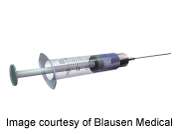Insulin injections have been associated with non-tuberculous mycobacteria cutaneous infections and cutaneous mycobacteria may have a prolonged incubation period, according to a literature review and case study published in the April issue of Clinical Diabetes.
(HealthDay)—Insulin injections have been associated with non-tuberculous mycobacteria cutaneous infections and cutaneous mycobacteria may have a prolonged incubation period, according to a literature review and case study published in the April issue of Clinical Diabetes.
Rabia A. Ahmed, M.D., from the University of Alberta in Edmonton, Canada, and colleagues conducted a review of cases of Mycobacterium immunogenum skin infection reported in the literature and present a case study.
The researchers report on a case of a 47-year-old white woman with type 1 diabetes, a bleeding diathesis, and iron deficiency anemia referred to an infectious diseases physician for assessment of a painful, non-healing skin lesion. After an extended incubation period of 63 days (compared to the conventional incubation period of 49 days), cultures tested positive for mycobacteria spp.
"We speculate that the practice of injecting insulin through clothing may have been a contributing factor to infection in our patient because it is possible that the organism was present on her clothing with subsequent injection into skin," the authors write. "Insulin injections have been associated with non-tuberculous mycobacteria cutaneous infections, and injection techniques should be reviewed with patients to prevent these infections."
Health News Copyright © 2013 HealthDay. All rights reserved.




















